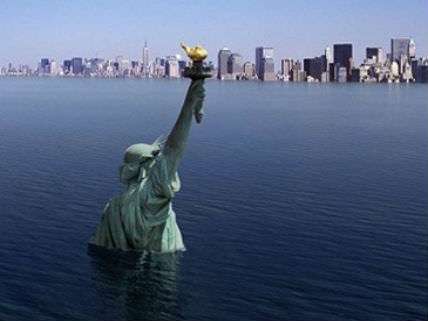"World's Most Famous Climate Scientist" Predicts 10 Feet of Sea Level Rise in Just 50 Years
James Hansen and his colleagues promote, uh, publish an alarming new study

"Peer review doesn't necessarily say that a paper is right," once observed Martin Blume, editor-in-chief of the American Physical Society. "It just says that it's worth publishing." So what does it say when a study is published without even the fig leaf of peer review? It must be REALLY worth publishing, right?
A huge media hullabaloo has broken out over a new study that will be made available later this week at the Atmospheric Chemistry and Physics Discussion where it will undergo "public peer review." But before that happens, the world's most famous climate scientist, James Hansen, is evidently eager to provoke alarming headlines by forwarding his conclusions to various media outlets.
A very alarmed Slate reporter describes the findings of the so-far unpublished and un-peer-reviewed study:
In what may prove to be a turning point for political action on climate change, a breathtaking new study casts extreme doubt about the near-term stability of global sea levels.
The study—written by James Hansen, NASA's former lead climate scientist, and 16 co-authors, many of whom are considered among the top in their fields—concludes that glaciers in Greenland and Antarctica will melt 10 times faster than previous consensus estimates, resulting in sea level rise of at least 10 feet in as little as 50 years. The study, which has not yet been peer reviewed, brings new importance to a feedback loop in the ocean near Antarctica that results in cooler freshwater from melting glaciers forcing warmer, saltier water underneath the ice sheets, speeding up the melting rate. Hansen, who is known for being alarmist and also right, acknowledges that his study implies change far beyond previous consensus estimates. In a conference call with reporters, he said he hoped the new findings would be "substantially more persuasive than anything previously published." I certainly find them to be.
To come to their findings, the authors used a mixture of paleoclimate records, computer models, and observations of current rates of sea level rise, but "the real world is moving somewhat faster than the model," Hansen says.
Hansen's study does not attempt to predict the precise timing of the feedback loop, only that it is "likely" to occur this century. The implications are mindboggling: In the study's likely scenario, New York City—and every other coastal city on the planet—may only have a few more decades of habitability left. That dire prediction, in Hansen's view, requires "emergency cooperation among nations."
The alarm has been sounded and peer review - public or otherwise - be damned.
One prediction of which I am absolutely certain: Expect lots more alarming reports on climate change to emerge as we get closer to the Paris U.N. Climate Change Conference this December at which a universal climate agreement is supposed to be concluded.


Show Comments (149)